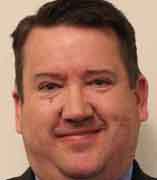
The Times pulls quotes from Biden statements, because who needs to ask a question? There's not a whisper of anonymous dissent, no hint of "senior Biden advisers shared opinions off the record so they could speak candidly." To evaluate Biden and his path forward, The Times also helpfully quotes Rep. James Clyburn (an early Biden endorser) and his Team Obama colleagues Robert Gibbs and David Axelrod.
Gibbs is there to acknowledge that Biden won't find it easy to be "above the fray" once he becomes president. Thanks, Captain Obvious.
But wait, someone might protest, is there a Republican quoted in there? There is! Stuart Stevens, one of Mitt Romney's top presidential campaign advisers in 2012 and an "outspoken" Trump critic, agreed with the dominant Biden-boosting spin. "I think he looks calm," he said. "Part of this whole moment is a return to normalcy." He added that the "Biden people" have "been very patient."
Really? Speaking of "calm" and "normalcy," Stevens responded in the hours after the horrid rioting on Capitol Hill by spouting on MSNBC that Trump was "calling on American terrorists to attack the Capitol, which they did more successfully than 9/11 terrorists." Stevens sounds exactly like one of those "seething" Democrats. He's not a cautious centrist.
Liberals love to insist they're on the "right side of history," and their confidence crests in the liberal dominance among historians. Just as the liberal media dominate our evaluation of day-to-day developments, liberals count on their historians to dominate our evaluation of the decades behind us.
It's not just historians but our taxpayer-funded storytellers, like the insufferable PBS documentarian Ken Burns. On the day before President-elect Joe Biden's inauguration, NPR's "Morning Edition" presented him as an American treasure with no partisan bias. So, skip over the propaganda film on Ted Kennedy he made for the 2008 Democratic National Convention, which portrayed Kennedy, according to Politico, as "the modern Ulysses bringing his party home to port."
It's pretty audacious to use such a metaphor for Teddy.
Don't notice that in 2020, Burns donated $2,800 to Rep. Alexandria Ocasio-Cortez and to Sara Gideon, who sought to unseat Sen. Susan Collins. Or his routine $5,000 donations to the Democratic Party of New Hampshire, the state in which he resides.
On "Morning Edition," Burns lauded the optimism of Franklin D. Roosevelt and then took FDR's inspirational mantle and spread it on Joe Biden, saying: "Joe Biden's biography ... has been defined by loss and suffering, but (with) the positive power to say: What are you going to do? You can't curl up in a ball. ... So let's put one foot in front of the other and we'll see what we can do. This was part of FDR's essential greatness, and that optimism is at the heart of it. You can hear echoes of it in Joe Biden."
The same morning, The Washington Post put a historian roundup on the front page under the headline "Not only Trump will face the judgment of history: America's commitment to democracy also to be scrutinized, scholars say." Reporter David Nakamura called on the usual liberal and leftist suspects:
1. Douglas Brinkley, a CNN staff historian and the John Kerry campaign's unofficial staff historian in 2004 with his hagiography "Tour of Duty." Brinkley ranks outgoing President Donald Trump near the bottom of presidents who "harmed the country."
2. Matthew Dallek, a "political historian" at George Washington University, who is political enough to suggest that all 74 million Trump voters cast doubt on the health of our democracy. Voting Republican proves our democracy is "incredibly fragile." Democracy equals Democratic victory.
3. Joseph Crespino, a history professor at Emory University who donated $500 to liberal Sen. Sherrod Brown, D-Ohio, in 2018. He worries that documentation of Trump's decision-making process may be difficult because "He's not a reader or a note-taker or a memo writer." Trump doesn't read? That's a little exaggerated, no? But it's standard Washington Post analysis.
4. Nicole Hemmer, a "historian who specializes in conservative media and is working on the Obama Presidency Oral History at Columbia University." Hemmer's a favorite of Brian Stelter on CNN. She says Trump and his movement show "we can understand that throughout American history there has been racism and fascism and anti-democratic forces and say he is drawing from those powerful influences."
5. Ruth Ben-Ghiat, a "New York University historian who studies fascism," repeats that Trump is "best understood in comparison to authoritarian-leaning figures abroad."
6. Leah Wright Rigueur, "associate professor of American history at Brandeis University," says Trump has been a case study of the "naked, unadulterated pursuit of power and self-interest, at the cost of 400,000 lives and at the cost of the American union."
In short, The Post assembles history like the Democratic National Committee would. There is no dissent. There is only one view of history that is "factual," and it lines up neatly, like a Ken Burns propaganda film for PBS.


 Contact The Editor
Contact The Editor
 Articles By This Author
Articles By This Author